Holding a Small Crab or: The Jewel and The Eye
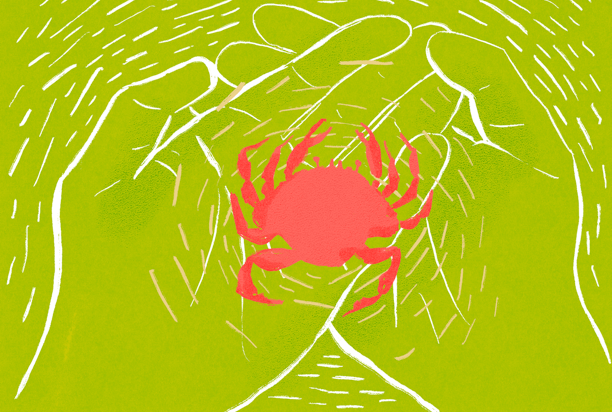
Welcome to Love Letters: Reasons to Be Alive. Thank you so much to everyone who backed the Kickstarter for this project last year. I am so excited to start sharing this incredible year of essays and art with you. You might recognize the essay below from the preview I sent out last year to celebrate a wildly ambitious pledge goal. The essay that will be in your inbox next week will be entirely new. I can't wait to share it with you, friends.
I'm so glad we're here.
-gailey

The tide is low, and the beach is all stones.
Barnacles and oysters cover every surface. Lichen laces the spaces between them. There is nowhere to stand that isn’t encrusted with evidence of life. Everything is history, here, and that history compulsively makes and unmakes with the rhythm of the tide. Barnacles insist themselves onto rocks and the ocean wears them away smooth and then the ocean wears away the rocks, too, tumbling them into sand. I tread across the stones in my big blue boots, crushing old barnacles, stamping footprints into the sand and am, in that moment, making and unmaking, made and unmade.
A patch of sand turns out to be damp underfoot. The discovery is somehow shocking. Stepping onto the sand and seeing seawater crush up out of it around the edges of my boot is like the realization that I’ve accidentally insulted a friend. I am intruding on this place and the secret water it holds inside its skin. But then I realize that I’m two or three steps away from a patch of perfectly clear water, and then the patch reveals itself to be an expanse, and I realize I’ve stumbled across a tidepool. It’s only a few knuckles deep, sun-warm, swarming with life. Algae and barnacles, yes, abundantly yes, but then more sudden movement and a hole appears in the sand and I realize I have just seen something hide itself from me.
It is a very, very, very small crab.
Once I see the first, I can’t help seeing the others. There are dozens of them. Hundreds, probably. Every time I see one, I see it because it’s vanishing into the sand. I crouch low and hold still and start to see the ones that aren’t fleeing my shadow. Some the size of my pinky fingernail; some the size of a key lime; some mottled grey, some bottle green, some pebbly orange. They scuttle from side to side. They reach up into the water to grasp for food that drifts past them in the evanescent currents of the tidepool – currents that are driven by the warmth of the sunlight and the puddles of cold in the shade of the tiny stones, currents that are accelerated every time one of their brothers hurries to shuffle himself down into the sand.
I look to my companions. We have known each other for less than a day. They did not choose my company for themselves. Their names still hesitate in the cup of my tongue before venturing between my lips; I’m still learning how to reach into the currents of their attention. I push past the hesitation and call out into the current: There are crabs. We all look. The looking is better because we are sharing it. In the time we’ve spent together, I’ve come to recognize that a few of my companions like to look closely at things, so I bring them a crab.
Here is how I do it. I lower my hands into the skin-warm water. Slow, slow. It feels like caressing my own cheek. My hands are on either side of an orange crab the size of a dime. Tenderly, thinking of honey dripping off the edge of a spoon into steaming tea, I slide my fingers into the sand. It’s finer and softer than I expected, small-grained, forgiving. I bring my hands together beneath the crab and then lift him out of the water on his little hilltop.
He doesn’t seem to notice at first. But then we all look at him, all our huge eyes, all our unknowable human mouth sounds, and he can’t know that we’re discussing how beautiful and perfect he is. How elegant the conductor’s wave of his little claws, how vibrant the hue of his carapace, how intelligent his small black eyes. He only knows that he should be hidden, and that he is not hidden, and so he tries to hide.
Down off the hill of sand he goes, and his footfalls on my palm are little light testing taps: What stone is this? What ground, what water? Where is there to go?
In the end, he decides that the best course of action is to burrow into the crevice between my cupped hands. He finds the shadow of it and nestles down into it: A soft space, large enough to accommodate a clever little crab, secure enough to guarantee safety from the searing interest of these earth-seizing creatures who have discovered him. His tiny hard body creates safety for itself there in the darkness of that warm valley.
For a moment, we knew each other perfectly. We were nothing at all save for what we were to each other, pure unpersoned perception and perceiving. He was a small jewel of interest. I was a massive unknowable eye. I was seeing, and he was seen. But now I have become the refuge that refuses the gaze of that eye, and we rotate in our binary-star gravity; my desire to meet and know is unrequited.
My curiosity turns to sympathy. I return him and his palmsbreadth world of sand to the water I took him from. I am gentle as I can be, which cannot be gentle enough to communicate “I’m sorry to have bothered you” to a creature who does not know what an apology is. As his sand melts into the rest of the sand in the tidepool—as it becomes impossible to tell which grains touched my skin and which didn’t—he burrows down, seeking the security that the valley of my hands momentarily provided.
I will never see him again. We will not know each other in the future. He will reach up into the great unknowable current that surrounds him, grasping at what seems like it might nourish him; so will I. He will keep finding places that make him feel something like safety. So will I. He will feed, he will grow, he will breed, he will die. So will I.
The only difference between us is the upturned palm beneath him. And as I walk away from his tidepool, my boots sinking into the sand, the sea bleeding up out of the surface I think of as solid ground—I think maybe that difference isn’t there, either.
I walk across the open hand of the world until I find a crevice in it. I strip off my clothes and dive in. I become unseen, and I am alive.

Love Letters: Reasons to Be Alive is a yearlong essay series in which we acknowledge, celebrate, and examine the objects and experiences that keep us going, even through the hardest of times. The series is free to read, for everyone, forever.
If you'd like to support the work of the team that makes this series and keeps Stone Soup running, you can subscribe here for as little as $1 per month, or you can drop a one-time donation into the tip jar.
In the meantime, remember: Do what you can. Care for yourself and the people around you. Believe that the world can be better than it is now. Never give up.
Sarah Gailey - Editor
Josh Storey - Production Assistant | Lydia Rogue - Copyeditor
Shing Yin Khor - Project Advisor | Kate Burgener - Production Designer


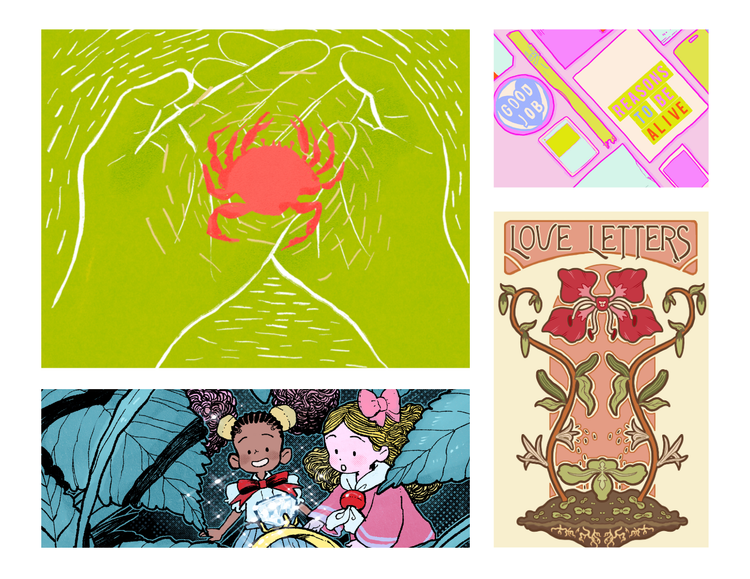
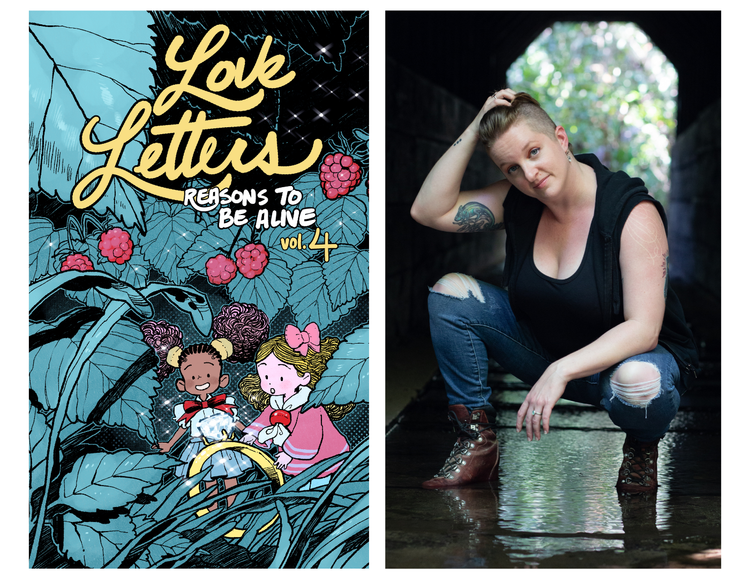
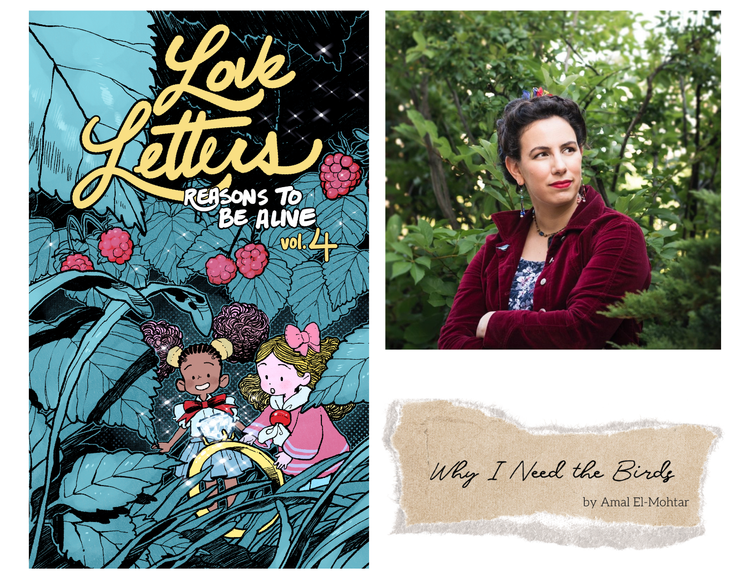
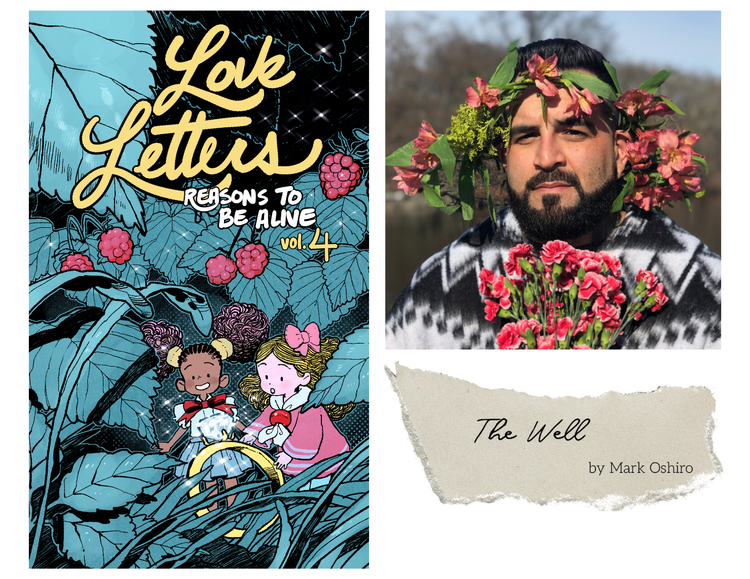
Member discussion